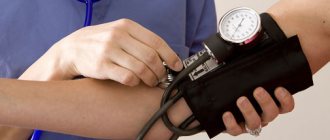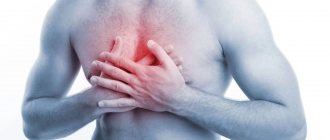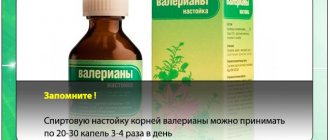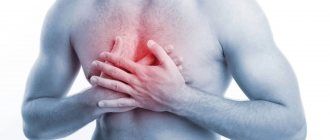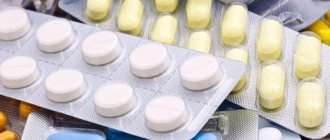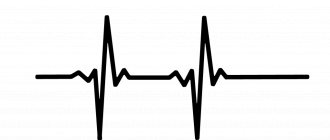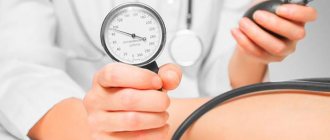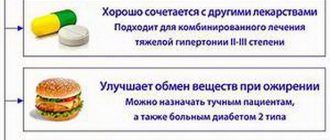Intoxication is a process that occurs in several stages, at each of which alcohol acts differently.
A little cognac in coffee can lower blood pressure, but the effects of libation have the opposite effect. To understand whether alcohol increases or decreases blood pressure, you need to study more information.
If we consider the question of how alcohol affects a person with high blood pressure, doctors say that blood pressure rises not from the alcohol itself, but from the condition that is provoked when a person drinks alcohol. Possible factors that provoke an increase in blood pressure:
- age;
- general condition of the body;
- taking pills;
- alcohol abuse;
- diet;
- activity.
People suffering from alcoholism are often diagnosed with the development of hypertension. The reason is that after drinking, the nervous system is stimulated.
But people who have low blood pressure should not think that since alcohol increases blood pressure, it can be taken instead of medicine. Nobody can forbid it - drink, but at your own peril and risk, and it is big.
How alcohol lowers blood pressure
Alcohol affects blood pressure, the first thing they note is that alcohol causes a strong heartbeat. Therefore, if you take a glass or two of vodka, and feel that your heartbeat has increased, you can see on the tonometer how your blood pressure numbers have increased.
As for the question of what kind of alcohol lowers blood pressure, it is more correct to ask - when the blood pressure drops from alcohol. And this happens more often at the very beginning of a feast, when a person has taken a small dose of alcohol, but provided that he did not drink the day before.
There is a certain danger in this state - if vodka lowers blood pressure sharply, a person becomes dizzy, has a heartache and feels weak, this could be an allergic reaction or a more serious problem, including a symptom of a heart attack.
Why does alcohol lower blood pressure?
Factors that contribute to a decrease in blood pressure during the first glass of alcohol are the following:
- increasing the speed of blood flow in the ventricles;
- decreased vascular tone;
- the addictive effect of alcohol toxins.
As soon as ethanol enters the body, the blood vessels dilate, losing their tone. Blood moves through them with a high degree of resistance, therefore, as a consequence of the libation, the pressure drops.
Normal ventricular function involves pushing out blood, but when the blood vessels dilate due to alcohol consumption, blood flow speeds up, which also lowers blood pressure. Oxygen ends up not reaching distant areas of the body, including the fingers. This can be recognized by loss of sensitivity. In case of chronic hypotension and vascular pathologies, it is better not to drink alcoholic beverages.
What drinks lower blood pressure
White wine and cognac are considered blood pressure-lowering drinks. Of course, this is not always true, since the result is influenced by the compatibility of drinks, a possible adverse reaction from alcohol, low-quality alcohol will not only lower blood pressure, but also provoke consequences close to death.
A person’s condition is influenced by the dose that was drunk the day before, since with a hangover the body’s reaction is different.
A reliable fact that helps answer whether alcohol increases or decreases blood pressure is the acceleration of the heartbeat due to ethanol entering the blood. As a result, the pressure increases.
But there are doses that reduce blood pressure - as mentioned above, this can be achieved by making coffee with cognac. This will dilate blood vessels and lower blood pressure. This property of cognac is presented by some as proof that alcohol is even beneficial for hypertension. However, this opinion is not true.
Firstly, if you have hypertension, you need to take the pills prescribed by your doctor, and whether you can drink alcohol with antihypertensive drugs is stated in the instructions for them. Secondly, only a doctor has the right to say whether it is possible to drink alcohol with hypertension, knowing the health of his patient. Thirdly, even if alcohol in the form of cognac is allowed for hypertension, it is a preventive 30 g per day and no more. And then - a doctor must allow alcohol at high blood pressure, even in such small doses.
What measures should be taken for hypertension caused by alcohol intoxication?
It is believed that alcohol in hypertension can lower blood pressure if drunk in moderation. It is also assumed that drinking a glass of wine or a glass of cognac cannot harm your health. A strong alcoholic drink can lower blood pressure immediately after consumption, which is explained by the effect of ethanol on the walls of blood vessels - they expand, and the pressure in them begins to drop. However, the removal of ethanol half-life products from the body is accompanied by stimulation of the parasympathetic nervous system, and some time after drinking alcohol, a narrowing of the veins and arteries occurs, resulting in an increase in blood pressure. Based on this, we can conclude that alcohol lowers blood pressure only temporarily and cannot have a positive effect on the general health of hypertensive patients.
If the body reacts to alcohol by increasing blood pressure, it is necessary to clarify how much it has increased. With a slight increase (no more than 20% of the initial pressure), it is recommended to take magnesium sulfate (magnesium). In this case, the initial pressure should be working, that is, habitual, with which the patient can live for a long time without reducing the quality of life.
If the patient experiences an increase for the first time or by more than 1/5 of the initial pressure, it is necessary to seek emergency medical help. The patient should not be left in this condition, since a sharp increase in blood pressure due to alcohol consumption can have quite dangerous consequences in the form of heart attacks and strokes.
What to do if your blood pressure drops sharply after vodka or cognac
If a person’s blood pressure drops sharply due to a hangover, he is advised to go to bed. A rolled up blanket or pillow is placed under the victim’s feet. Your legs should be slightly higher than your head. The window in the room must be opened; if a person is wearing tight clothes, unbutton them, loosen the belt, etc.
If the blood pressure drops after drinking alcohol, then the temperature will drop, so you need to cover the person with a blanket and give him strong sweet tea with ginseng tincture. You need to measure your blood pressure at intervals of 15 minutes, and if the blood pressure continues to drop after a binge and the person faints, you need to call an ambulance.
What to do
Despite the ability of alcohol to increase blood pressure, you should not have a hangover in this situation; it may get worse. What to do with low blood pressure after binge drinking depends on the circumstances. If the condition worsens slightly, you can try to solve the problem yourself. Treatment at home is possible with normal initial pressure, situational reduction in numbers to 80/50 mm Hg. Art. and no fainting.
The main reason for a drop in blood pressure after drinking alcohol is a lack of fluid in the body. It will not be possible to replenish it with ordinary water - due to a lack of electrolytes, it will quickly be excreted through the kidneys or pass into the tissues, which will lead to worsening edema. To restore the water-electrolyte balance, use non-carbonated alkaline mineral water and special pharmaceutical-grade rehydration solutions (Rehydron and analogues).
You should not rely on coffee - this drink not only has a hypertensive effect, but also increases urination, therefore, it can worsen dehydration, which will lead to a repeated decrease in blood pressure. Easily digestible nutritious food will help replenish energy resources: weak meat broth, cottage cheese, fermented milk products. When choosing, you should listen to your body, but do not allow it anything fatty, spicy or fried.
Once you feel better, you can move around. You shouldn’t give an intense load - the body is not ready for it. It is better to do a light workout or take a leisurely walk in a quiet place. Physical activity increases the level of adrenaline, which, in turn, improves vascular tone.
How alcohol increases blood pressure
As mentioned above, the effect of alcohol on blood pressure can be different; often at the beginning of a feast, blood pressure drops, but as the heart rate increases, soon the pressure begins to rise. According to doctors, chronic alcoholics suffer from hypertension. Healthy people can experience high blood pressure with a hangover when it exceeds the norm by 10-30 mm.
Those who already have high blood pressure should not experiment - alcohol increases blood pressure, and this has been proven, and therefore can provoke a hypertensive crisis in people prone to this. Those who are looking for how to reduce blood pressure from a hangover can only sympathize.
Symptoms indicating high blood pressure from a hangover are tachycardia, excessive sweating, dizziness, facial flushing, anxiety and chills. If high blood pressure after drinking alcohol manifests itself with such symptoms, you need to consult a doctor, since a stroke, heart attack, or kidney failure may occur against the background of a hypertensive crisis.
When learning from friends and colleagues whether vodka increases or decreases blood pressure, it is more important to obtain information that alcohol disrupts kidney function, stimulates the nervous system, causes rapid heartbeat and disrupts the regulation of hormones and enzymes. If you regularly abuse alcohol, ethanol will stimulate parts of the nervous system, accumulating in the body and poisoning it. In addition, high blood pressure is caused by kidney failure.
Read also: Is it possible to reduce fever with alcohol?
Signs
Symptoms vary depending on the magnitude of the drop in blood pressure, the general condition of the body and its compensatory capabilities. Typical manifestations are:
- weakness, drowsiness, “dullness”, “cotton head”;
- indifference or, on the contrary, emotional instability;
- tachycardia;
- shortness of breath, worsening with physical exertion;
- pallor, increased sweating;
- dizziness, which increases when moving from a horizontal to a vertical position;
- pre-fainting states, fainting, especially in stuffy and crowded conditions, inability to take a comfortable position, prolonged standing;
- pressing or bursting pain with an epicenter in the frontal or temporal region;
- thermoregulation disorders.
What drinks increase blood pressure
When asked which alcohol increases blood pressure monitor readings, the answer is champagne, beer and wine. But this is not an exact answer, since the same cognac, which lowers blood pressure in small doses, can cause hypertension when consumed in excess of 80 ml. It is impossible to predict what kind of alcohol you can drink with high blood pressure so as not to cause a jump in blood pressure. Any alcohol affects the heart and blood vessels, and toxins impair the functions of the kidneys, nervous system, and liver.
People with hypertension need to be extremely careful during feasts, since increased blood pressure threatens heart complications. And if your blood pressure suddenly rises sharply due to a hangover, what to do is to ask your doctor, not your friends. Especially if the pressure surge exceeds 10 mm from normal. Before the ambulance arrives, the victim must be seated, since in a lying position the pressure increases and breathing is impaired.
If this is not the first attack of pressure, you can give the usual drug prescribed to the patient by a doctor. But other medications cannot be given before the ambulance arrives. An exception is nitroglycerin - it can be placed under the tongue if there is pain in the heart area.
The room needs to be ventilated; a bottle of hot water can be placed at the victim’s feet. The patient needs to be reassured to eliminate the panic attack.
Doctors have long proven that alcohol-containing products have an extremely negative effect on human health.
This is due to the fact that alcohol is an excellent solvent, causes an irreparable blow to vital organs and can cause addiction if consumed regularly.
Letters from our readers
My grandmother’s hypertension is hereditary - most likely, I will have the same problems as I get older.
I accidentally found an article on the Internet that literally saved my grandmother. She was tormented by headaches and had a repeated crisis. I bought the course and monitored the correct treatment.
After 6 weeks she even started talking differently. She said that her head no longer hurts, but she still takes pills for blood pressure. I am sending a link to the article
What alcohol is acceptable for hypotension?
Drinks such as dry wine (red or white), as well as cognac, are definitely not recommended, unless otherwise recommended by a doctor. Sometimes doctors advise patients to take 20-30 ml of good cognac.
There are significantly more alcoholic drinks that increase blood pressure. But what kind of alcohol can you drink with low blood pressure? The list of conditionally permitted products includes beer, semi-sweet red wine, champagne, and vodka. But be careful, because after consuming them, the heart rate accelerates and blood pressure rises sharply, which can have a negative effect. In the initial stages of hypotension, these alcoholic drinks can be consumed in reasonable doses and in rare cases, otherwise it will be impossible to cure the disease.
The effect of alcohol on the human body and its effect on blood pressure
It is known that alcohol taken in large doses has a negative effect on the human body. In particular, high risk is associated with blood pressure.
When alcohol enters the body, it initially dilates the walls of blood vessels, as a result of which the pressure decreases.
But after a certain time, the reverse process begins in the body: the walls of blood vessels narrow sharply, the heartbeat quickens, which leads to increased blood pressure.
In this case, a violation of peripheral circulation is often observed.
Conditions under which alcohol increases blood pressure:
- the consumed dose of alcohol is more than 70 ml;
- frequent consumption of alcoholic beverages;
- drinks stronger than 25 degrees;
- predisposition to hypertension;
- elderly age.
Almost any drink containing alcohol constricts blood vessels, and people suffering from hypertension often put themselves in danger by drinking too much alcohol in the hope of normalizing their blood pressure.
Why do you get headaches when you have a hangover?
The main causes of headaches during a hangover are:
- intoxication. Excessive alcohol consumption produces a large amount of acetaldehyde in the body, a toxic breakdown product of ethanol. It enters the bloodstream, then into the brain, disrupts neural connections and leads to a disorder of brain activity;
- dehydration. Drinking 200 g of alcohol removes about 850 g of liquid, and along with it useful microelements. The body, in an attempt to restore water balance, takes fluid from the brain, which leads to a decrease in its size and provokes severe pain;
- the effect of alcohol on blood vessels. Alcohol sharply dilates and then constricts blood vessels, which leads to spasm and intense headache;
- mixing several types of alcohol. When taking various alcoholic drinks, even in small quantities, the intoxication of the body will be many times stronger. For example, when drinking strong alcohol, the enzyme that breaks down ethanol is blocked. Sweet alcohol (liqueur, champagne) increases the concentration of sugar. Consuming alcoholic drinks of different strengths together causes damage to the liver and leads to increased formation of toxins;
- type of alcohol consumed. Some alcoholic drinks (wine, cognac, beer) contain various chemicals. They can cause a severe headache, as can eating certain snacks. Cheeses and meats contain tyramines, which provoke the development of migraines;
- smoking with alcohol. Nicotine stimulates increased production of dopamine, the happiness hormone. Short-term euphoria subsequently leads to severe headaches.
Doctors at our clinic will help cure alcoholism.
The occurrence of headaches during a hangover is associated with age. The older a person is, the worse his body copes with alcohol. This is due to a decrease in enzymatic activity. The rate of ethanol processing decreases, alcohol stays in the body longer. The poisoning intensifies and a severe headache occurs.
It is better to stop drinking alcohol altogether or drink the minimum allowable dose, which is 30 g of ethanol for women and 50 g for men. As a last resort, it is recommended not to mix drinks, and also to refuse cocktails, to monitor the quantity and quality of alcohol taken in order to avoid unpleasant consequences in the form of poor health in the morning.
Increased blood pressure immediately after drinking alcohol
When drinking alcoholic beverages in large quantities, you must be prepared for a sudden increase in blood pressure.
In this case, it is necessary to act according to the current situation:
- If there is a sharp and severe increase in blood pressure, it is best to immediately call an ambulance, otherwise the situation is fraught with death. A dangerous jump is one in which the difference from normal everyday pressure is more than 25 percent.
- If the pressure has increased slightly, but these sensations cause discomfort, then you can take magnesium sulfate. It will help quickly bring blood vessels back to normal and stabilize blood pressure.
Doctors identify several symptoms by which the body signals an increase in blood pressure:
- covering the skin with red spots;
- the appearance of shortness of breath, a sharp lack of oxygen;
- increased heart rate and pulse;
- noises, whistling in the ears;
- multiple glares before the eyes;
- Strong headache;
- cutting pain in the chest;
- lethargy, feeling of weakness, physical depression;
- in rare cases, loss of consciousness is possible.
It must be remembered that even with a slight increase in blood pressure, one cannot hope that hypertension will go away on its own.
Now hypertension can be cured by restoring blood vessels.
High blood pressure the next day
Often, the symptoms of hypertension do not appear immediately, but only in the morning after drinking alcohol. This not only causes a lot of inconvenience and trouble for those who drink strong drinks, but also often leads to extremely serious consequences.
The morning after drinking large quantities of alcohol, it is necessary to measure your blood pressure, especially for people prone to hypertension. If the indicators are high, you should immediately try to bring its condition back to normal. This can be done both with the help of medications prescribed by doctors and with the help of folk remedies.
Alcohol has a very negative effect on kidney function, as a result of which the activity of the cardiovascular system is disrupted.
One should also take into account the fact that a person may have serious health problems, and a sharp increase in blood pressure can catastrophically worsen the situation.
At the moment, there are many ways to help cope with a hangover in a short time. If your blood pressure does not exceed a critical level, you can even prepare medicinal drinks at home to help bring your blood pressure back to normal and quickly get rid of a hangover.
We offer a discount to readers of our site!
Recipes for home remedies for high blood pressure after drinking:
- Add carrot juice, a tablespoon of honey to a glass of mineral water and squeeze half a lemon.
- Mix a tablespoon of honey with beet juice, drink 3 tbsp. spoons 3 times a day. Instead of beet juice, you can use carrot juice.
- Leave the grated horseradish in a dark place for 36 hours. Mix the squeezed juice with the same amount of carrot juice, add the juice squeezed from the lemon. Take a tablespoon 3 times a day.
Read also: Is it possible to drink alcohol while taking antiviral drugs?
Prevention and recommendations
High blood pressure is a very common disease. People suffering from hypertension are advised to completely stop drinking alcohol.
It is not recommended to use alcoholic beverages as medications for high or low blood pressure.
To maintain health, the main condition is to review your daily lifestyle and make the required adjustments to your daily routine, for example:
- complete cessation of alcohol consumption;
- reducing salt in food;
- balanced and rational diet (it is necessary to reduce the consumption of food containing natural fats and carbohydrates);
- adding foods enriched with potassium, magnesium and calcium to the daily menu;
- daily exercise, frequent walks in nature;
- complete cessation of tobacco products;
- fight against excess weight (you need to consult a nutritionist and follow the system he developed);
- it is necessary to normalize sleep patterns (healthy sleep should be more than 8 hours a day);
- drawing up and following a clear daily routine;
- avoidance of stressful situations;
- use of medications prescribed by the attending physician.
Hypertension, unfortunately, always leads to heart attack or stroke and death. Only constant use of antihypertensive drugs could allow a person to live.
Boqueria L.A. spoke about the treatment of hypertension in 2019.
Few people associate poor health after drinking alcohol with increased blood pressure. However, this is one of the main reasons why hangovers are so hard to bear. If a person drinks alcohol from time to time, then pressure surges will be sporadic. With chronic alcoholism, it is possible to develop hypertension, and then other, more serious conditions.
Alcohol and blood vessels
The consumption of ethanol-containing products is accompanied by a moderate increase in blood pressure. According to research, on average, the numbers increase by 5–10 mm Hg. Art. In patients with hypertension, the changes are more pronounced. Against the background of abuse, the elasticity of blood vessels decreases, so this option is more often observed in chronic alcoholism stages 2 and 3.
Low blood pressure after binge drinking is more typical for everyday drunkenness or stage 1 addiction. Binge becomes a trigger factor. Changes are provoked by the diuretic effect of alcohol, disturbances in water and electrolyte balance, fluctuations in the level of neurotransmitters and the toxic effect of ethanol metabolites on the heart muscle.
Alcohol stimulates blood circulation in the kidneys. More fluid passes through the organs per unit of time, which means more urine is released. A decrease in the volume of circulating blood leads to a decrease in pressure on the walls of blood vessels. Electrolytes are excreted in the urine. Activation of metabolic processes in the body leads to increased consumption of proteins. The listed compounds affect osmotic pressure. When it decreases, fluid leaves the cells into the tissues, so after heavy drinking, low blood pressure is combined with edema.
A distinctive feature of alcoholics is a predominant drop in systolic pressure while maintaining or slightly decreasing diastolic pressure. This is explained by a decrease in cardiac output due to the cardiotoxic effects of alcohol. The situation is aggravated by disruption of the production of neurotransmitters in the brain due to the influence of ethanol breakdown products with subsequent changes in the functioning of the vasomotor center.
Lack of sleep, physical and emotional stress, and depression after heavy drinking play a certain role in the development of hypotension. Sometimes the pressure drops sharply when you remain in a horizontal position for a long time.
Why does blood pressure rise after drinking alcohol?
The most common cause of a jump in blood pressure (BP) is vasospasm . Alcohol is known to dilate blood vessels. Therefore, in a state of intoxication, blood flows intensely to the brain, and when the effect of alcohol decreases, the vessels narrow sharply, a spasm occurs, and the blood can no longer move through them as freely. As a result, blood pressure increases and characteristic symptoms appear:
- rapid heartbeat, discomfort in the heart area;
- headaches, dizziness;
- nausea and vomiting;
- chills;
- heat;
- trembling in the limbs;
- strong thirst;
- sweating, swelling;
- stomach ache.
Increased rates in alcoholics are also facilitated by kidney problems, which are directly involved in maintaining normal blood pressure levels. Fluid retention occurs due to poor organ function, swelling appears, which affects blood flow.
But there are also a number of other reasons why blood pressure rises:
- The toxic effect of alcohol on the areas of the central nervous system responsible for vascular tone.
- Alcohol disrupts the normal functioning of the adrenal glands, causing an increased release of adrenaline.
- Ethanol destroys red blood cells, the dead cells collect in clots, causing the blood to become less liquid. It is more difficult for the heart to pump thick blood, so the body increases the pressure.
- Alcohol leads to dehydration, which also causes the blood to thicken.
Deterioration in health may occur four to eight hours after intoxication. Older people , after 45 years, are most susceptible to increased blood pressure due to alcohol. Younger people are less likely to suffer from this disorder, since the blood vessels are more elastic and more easily adapt to sudden expansion or contraction and do not spasm so much.
What to do if your blood pressure suddenly rises
If a person suddenly becomes ill while intoxicated, then most likely his blood pressure has risen. First of all, you need to measure your blood pressure. If the values do not exceed 170/110 or the maximum for an alcoholic already suffering from hypertension, then you can try to lower it yourself.
If after using folk remedies, and especially medications, there is no improvement within half an hour, but, on the contrary, the patient becomes worse, you should immediately call an ambulance.
The main symptoms for which you should definitely call a doctor :
- confusion;
- speech impairment, problems with vision, hearing;
- severe chest pain;
- very high heart rate;
- purplish-red complexion;
- loss of consciousness.
To reduce blood pressure at home, medications and folk remedies are used.
Medicines and drugs
Without a doctor, if there is a sharp jump in blood pressure, you should not take medications. There is still ethanol in the body, which, when combined with medications, can only cause a worsening of the condition.
You should not take medications for hypertension if you are intoxicated or have a hangover. Even those that were previously prescribed to a hypertensive patient, and which he takes as normal.
Among medications, it is possible to use Capoten or Corvalol, but only after agreement with the doctor, for example, by telephone. Taking magnesium (magnesium sulfate) is considered relatively safe.
The most basic thing that can be done is to provide the patient with peace, give him sorbents (activated carbon) so that the hangover syndrome passes quickly. No more medications should be given without the approval of a medical specialist.
Folk remedies
Some folk recipes will help reduce sharply increased blood pressure levels and improve well-being. In addition to them, it is necessary to provide the patient with an influx of fresh air and rest.
- Water with honey and lemon juice . Add half a tablespoon of lemon juice and a teaspoon of natural honey to a glass of water and give it to the patient to drink.
- Mustard plaster . You need to moisten the mustard plaster and apply it to the back of your head. This will help relieve spasm, dilate blood vessels, and as a result, the pressure will begin to decrease.
- Vinegar compress . Dilute vinegar in water in equal proportions (apple vinegar is best). Soak a handkerchief or small towel in the solution, place it on your forehead, and wait for a while. This compress helps reduce headaches due to high blood pressure. Another option is to apply a compress to your feet, repeating three times, and then wash your feet with running water.
Help from doctors
As a rule, doctors use vasodilators, medications to relieve intoxication and prevent dehydration. If necessary, droppers are used to normalize blood pressure and minimize possible complications.
The main rule: call an ambulance immediately if the pressure surge occurs for the first time, or if the pressure has increased more than usual.
Only doctors can provide qualified assistance and select the necessary medicine, as well as the dosage for a specific case.
Read also: Which cigarette element uses lss technology?
High blood pressure the next day
Most often, a person feels an increase in blood pressure the next morning after drinking alcohol. Characteristic symptoms of a hangover and signs of hypertension occur. If the condition is not critical, then you can try to reduce the pressure yourself at home, but only after consulting a doctor. For this purpose, medications are used, often in combination with traditional recipes.
You should also pay close attention to what you should not do to alleviate the condition:
- take hot baths, visit a sauna or steam bath;
- drink strong tea or coffee;
- eat too much (especially fried, spicy or salty foods).
To quickly cope with poor health, it is useful to be in a well-ventilated area, drink enough plain clean water, eat light food, and do not overeat. In this case, the patient is shown rest and good sleep. Physical activity, as well as any travel, should be excluded.
Medicines
Most people are interested in how to lower blood pressure with medications. After all, this is the most familiar, as well as the simplest way to combat any ailments.
The list of drugs approved for self-use is not too long. But these medications should also be used with caution , after consulting with a specialist.
The action of the drugs is aimed at relieving vascular spasms, thinning the blood, eliminating symptoms of intoxication, and preventing dehydration. Most commonly prescribed medications:
- No-shpa, Papaverine - restore arterial tone, relieve spasms;
- Aspirin – thins the blood and improves blood flow;
- Mexidol, Piracetam - improve cerebral circulation;
- Furosemide, Torsid - dilate blood vessels, reduce swelling;
- Analgin, Paracetamol - relieve headaches;
- Capozide, Adelfan - normalize blood pressure;
- Magnesium sulfate – restores sleep, relieves swelling and headaches;
- Alka-Seltzer, Zenalk, Piel-alco - fight hangover syndrome, reduce intracranial pressure, and restore strength.
When using medications, you need to take into account all contraindications and possible side effects, strictly adhere to dosages , without exceeding them. It is also forbidden to drink alcohol, in any form, during treatment with drugs.
Folk recipes
If the next day after drinking alcohol, your blood pressure increases and its level does not exceed the permissible values, you can try to cope with the help of folk remedies. There are many of them:
- Beetroot juice with honey . This is a fairly effective remedy that quickly helps reduce indicators. Take a few root vegetables, wash them well, peel them, and squeeze the juice out of them. Keep the resulting juice in the refrigerator for at least four hours, then add a tablespoon of natural honey to one glass of juice and stir until completely dissolved. Fresh beet juice can cause vasospasm, and the opposite effect will be obtained, so it is important to follow the recipe and not use the juice immediately after receiving it. Take the drug twenty minutes before meals, one-third of a glass three times a day. Beetroot juice should not be taken at the same time as medications that lower blood pressure, as this can cause severe hypotension.
- Herb tea . Mix hawthorn, mistletoe, cucumber, and motherwort in equal proportions. Pour one tablespoon of the mixture into a glass of boiling water, leave for fifteen to twenty minutes, strain. Drink one glass after meals.
- A decoction of lingonberry leaves . Pour two tablespoons of dry leaves into half a liter of boiling water, leave for one hour, then strain. Take half a glass three times a day before meals.
- A decoction of rosehip and hawthorn . Mix twenty grams of dry berries and add a glass of water. Boil for half an hour over low heat, squeeze out the berries, strain the broth, then add hot water to the original amount. Take one tablespoon three times a day.
- Nut mixture . Mix one glass of chopped walnut kernels with one glass of honey, add twenty grated apricot kernels and the juice of three lemons. Mix everything well and take one tablespoon before meals.
- Viburnum drink . Pour one tablespoon of viburnum berries with half a glass of hot water, simmer for ten minutes in a water bath, then strain and bring the volume to a glass. Drink in small portions throughout the day.
What medications relieve headaches during a hangover?
Drug therapy is an effective way to cope with hangover headaches when folk remedies are powerless. To alleviate the condition, you can drink a sorbent, analgesic or antispasmodic. Before taking, you should carefully study the instructions and measure your blood pressure. Many drugs are incompatible with alcohol, have contraindications and can only make you feel worse. Some medications aggravate the condition with high or low blood pressure.
Sorbents
Absorbent drugs are the first aid for alcohol abuse. They provide quick detoxification and help get rid of unpleasant hangover symptoms. The simplest and most popular remedy is activated carbon. The sorbent has a quick effect and alleviates the condition. The drug should be taken in a minimum dosage of 1 tablet per 10 kg of weight. The stronger the intoxication, the higher the dose of the medication, so it is better to drink activated carbon in the form of a soluble powder.
Enterosgel is a modern analogue of activated carbon. To alleviate the condition, even with severe intoxication, only 1-3 tablespoons of sorbent are enough. The drug is used both for hangover syndrome and for its prevention. If you drink Enterosgel before drinking alcohol, it will reduce the degree of absorption of alcohol, reduce the unpleasant consequences of drinking alcohol, but will prevent the desired effect of intoxication.
Sorbents are compatible with other medications. They should be taken at intervals of 1.5-2 hours from taking other medications. Otherwise, the effectiveness of the drugs will decrease.
No-Shpa
The plant-based drug dilates blood vessels and relieves spasms, which helps eliminate headaches due to hangover syndrome. No-Spa slows down the absorption of alcohol, improves well-being, and facilitates the functioning of the liver and stomach. The drug should not be taken if you have chronic kidney or liver diseases. Simultaneous use of No-Shpa with alcohol can lead to swelling and a sharp decrease in blood pressure.
Aspirin
The drug thins the blood and has an analgesic effect. Aspirin acts within 10-15 minutes after administration, normalizes the condition of blood vessels, improves blood flow and quickly relieves hangover symptoms.
The drug should not be taken if you have gastrointestinal diseases. Aspirin may cause bleeding in people with chronic stomach problems or after exceeding the recommended dosage of the medication.
Ibuprofen
Ibuprofen has a strong analgesic effect and does not irritate the gastric mucosa, unlike other painkillers, so it can be taken even for gastrointestinal diseases. The drug acts for 3-4 hours. The necessary effect of the drug for a hangover occurs only with the simultaneous consumption of a sufficient amount of liquid.
Alkozeltzer
The drug contains acetylsalicylic acid, thins the blood, has an anti-inflammatory and analgesic effect. Available in the form of water-soluble tablets, it has a pleasant taste. Like Aspirin, Alkozeltzer should not be taken if you have problems with the gastrointestinal tract. An analogue of the drug is Alka-Prim.
Antipohmelin
It helps not only to get rid of headaches during a hangover, but also to prevent unpleasant symptoms if you drink the drug before a feast. Antipohmelin does not have a detoxifying effect, therefore it is ineffective for alcohol poisoning.
Medicines help to quickly cope with headaches, but have contraindications. Before taking medications, it is better to consult a doctor to avoid side effects.
Consequences
If, after drinking alcohol, a person’s blood pressure begins to constantly rise, then after some time hypertension may develop , which will be observed even without drinking alcohol. It is difficult to treat already developed hypertension; as a rule, it remains with a person for life. The patient is forced to constantly monitor blood pressure levels and take medications.
Increased blood pressure is also dangerous because it is often asymptomatic. However, if you do not start reducing it in time, a hypertensive crisis may occur. Without medical help, this can lead to serious consequences, including cardiac arrest, heart attack or stroke.
About the dangers of alcohol for hypotensive patients
What kind of alcohol is allowed for low blood pressure and can it be consumed at all for hypotension? Some people take a glass for appetite before meals to raise their blood pressure. It is very mistaken to believe that small doses of wine or cognac are beneficial.
If you take even small portions of alcohol before meals for a long time, it will turn into a habit and develop into an addiction. It is not far from alcohol dependence, and age, the body’s resistance to alcohol and experience in this case are almost irrelevant.
Experienced doctors definitely do not recommend drinking alcohol. It is better to seek professional medical help, which includes diagnostics, procedures and medications, and leave self-medication of hypotension with alcohol for someone else!
Prevention
Prevention should begin with giving up alcohol. If you can’t do this right away, you need to reduce the dose of alcohol you drink at a time and drink it as rarely as possible.
But only a complete abstinence from alcohol will make it possible to avoid pressure surges. And if hypertension has already developed due to alcohol, then it definitely needs to be completely excluded. Otherwise, tragic consequences cannot be avoided .
But you should also follow general prevention recommendations:
- Spend time in the fresh air as often as possible (in a park, or best of all, in nature, outside the city limits).
- Form a correct, complete diet, with a predominance of fresh vegetables, fruits, and natural juices. The consumption of fatty, fried, spicy and salty foods should be minimized.
- Drink enough plain still water every day.
- Reduce the consumption of coffee and tea, replacing them with natural compotes, fruit drinks, herbal teas (you need to pay close attention to the composition of herbal tea, as there are plants that increase blood pressure).
- Include light physical activity in your daily routine, such as walking, cycling, swimming. But you can’t overload, the loads should be moderate and enjoyable.
- Quit smoking if you have such a habit.
- See a cardiologist on an ongoing basis, and also periodically check your blood pressure levels yourself.
If you follow all the recommendations, you can prevent the development of hypertension. If it already exists, then you can stop its progression, maintain good health, and reduce the risks of complications.
